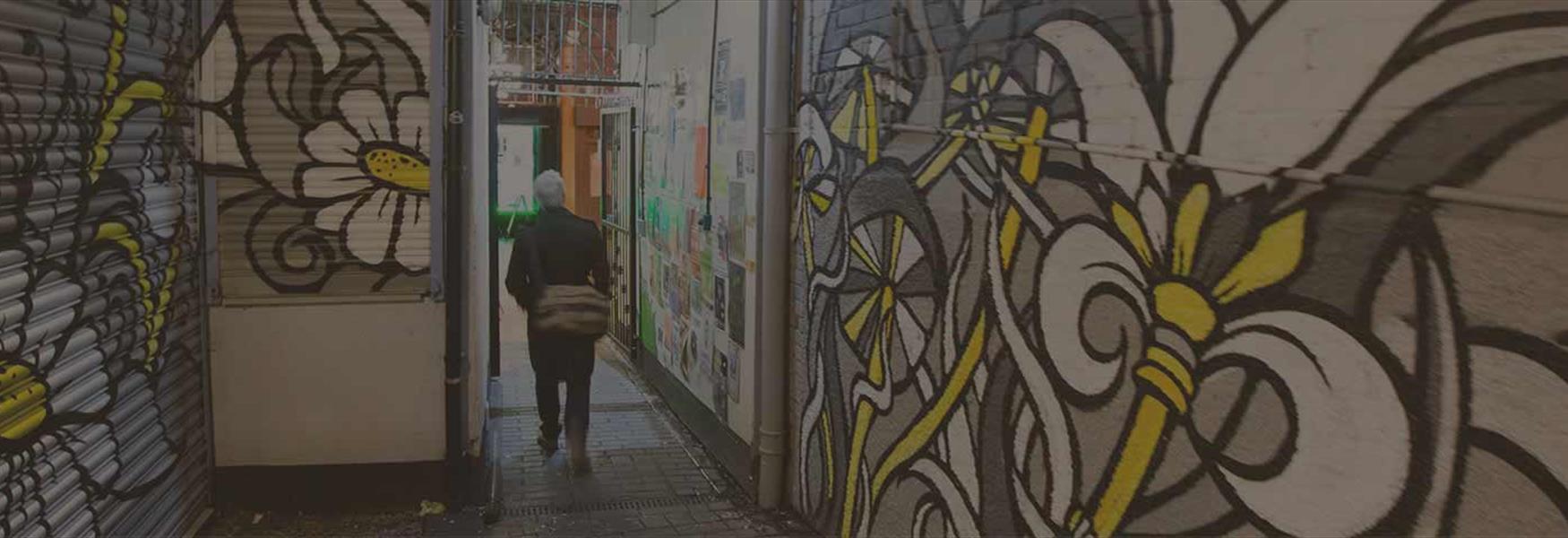To provide you with the best experience, cookies are used on this site. Find out more here.

To provide you with the best experience, cookies are used on this site. Find out more here.

Nottingham’s Medieval Town Wall
Located at the top of Maid Marian Way, next to Chapel Bar
Open all year round | Free
Words and images by Joe Earp and the Nottingham Hidden History Team.
Only one part of Nottingham’s original medieval town wall can be seen in it’s original position. It is located within a hotel complex close to Chapel Bar in Nottingham.
It is thought that Nottingham’s town wall took 60 years to complete, starting around 1260. The town wall replaced 12th century earthen defences and ditches. It extended well over 1Km, starting from Nottingham Castle’s defences to the west, down Park Row and along Parliament street to the east. Stone gates controlled the roads into the town, at Chapel Bar, Cow Gate, St John’s Bar and Swine Bar. East of Swine Bar the defences remained as an earth bank with a ditch at the front.
The wall was said to of been needed after what Stapleton (1912) describes as “the virtual anarchy of the Barons’ Wars”. He goes on to state:
“In the the course of the Barron’s Wall Nottingham was thrice sacked and burnt. Whether in consequence of these sanguinary experiences, or because it was becoming the contemporary practice, the project of adequately fortifying the town with stone walls and gates was seriously taken in hand”.
The defences linked the old Anglo-Saxon town and the castle, enclosing a lower ground only occupied since the Norman Conquest (1066). There is no evidence of southern defences where the river, marsh and cliff provided natural defences. From this time until the mid 19th century, Nottingham’s physical extent remained unaltered.
Much of the town wall had been demolished by 1540. Further robbing of the wall for building stones, resulted in the virtual disappearance of the town wall by the late 17th century.
The surviving medieval wall is overlain by a 19th century stone brick wall and floor. Also it is overlain by a 17/18th century brick wall, projecting at right angles from beneath the floor. The bricks have been left in place because they support the original medieval wall.
The impressive face of the wall is made of ‘ashlar’: flat faced and course blocks of local sandstone bonded with mortar. Behind the face of it, it is made of cheaper building materials. This construction method was used as it obtained the maximum effect for least cost. Irregular foundation stones at the foot of the face indicate the original ground level.
The full height of the wall may have been 8m (26ft, three times the surviving height) with a path along the top defended by battlements. A wide ditch lay along the front of the wall and an earth bank was heaped up at the back over the lower courses of the wall.
At the far end of the surviving wall, a stone in the lowest course bears a incised mason’s mark which is a simple cross (see below picture). Each mason had their own style of mark to show who had laid each piece of masonry work.
| Season (1 Jan 2025 - 31 Dec 2025) |
|---|
Anish Kapoor's Sky Mirror is a must see piece of art, located at Nottingham Playhouse…
Nottingham Cathedral (the Cathedral Church of St Barnabas) was designed and built under…
Bromley House Library, founded 1816, is a flourishing independent lending library…
Fun Station is a vibrant family entertainment centre at The Cornerhouse, full of…
Axed Nottingham have brought next level urban axe throwing to the City centre!
Start your epic adventure at The Lost City Adventure Golf in The Cornerhouse!
Beloved by locals as a famous ‘meeting place’, Nottingham’s Left Lion is one of two stone…
The Park Tunnel was built in 1855 to allow horsedrawn carriages access to The Park Estate…
A focal point for residents and visitors, Old Market Square is where friends meet,…
A historic wall which divided Nottingham’s Old Market Square for 700 years has been…
It was here on 25th August 1642 that the Royal Standard was raised by Charles I, marking…
It takes a building of some distinction to stand out in a city as rich in beautiful and…
Logiclock is an entertaining puzzle-based live escape game, designed for small groups of…
The Brian Clough statue stands proudly in Nottingham city centre just off Old Market…
St Peter’s Church is one of the three mediaeval churches in Nottingham, the others being…
